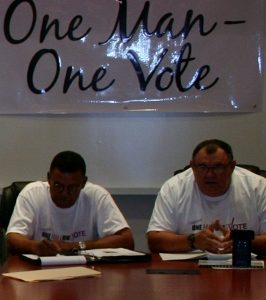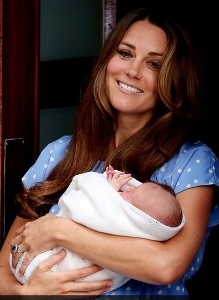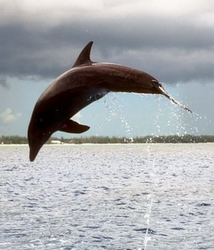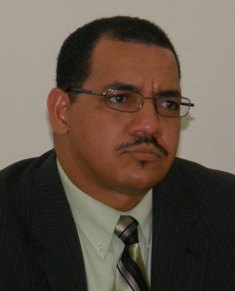Archive for July 23rd, 2013

Voter equality recommended
 (CNS): The final report on the May General Election by a mission of international observers has called on Cayman to implement equal suffrage for voters. Pointing to the principle of “one person one vote or equal number of votes”, the observer team said Cayman should make voting more fair. The report recommends a change to the law to stop numbering ballot papers to protect voting secrecy and also suggested reducing the period of residency in Cayman before an elector can register to vote. The required period of residency for candidates prior to the date of nomination should also be reduced, they said, and the legal definition of ‘own act’ clarified in relation to dual citizenship – both issues on which Tara Rivers' election was challenged.
(CNS): The final report on the May General Election by a mission of international observers has called on Cayman to implement equal suffrage for voters. Pointing to the principle of “one person one vote or equal number of votes”, the observer team said Cayman should make voting more fair. The report recommends a change to the law to stop numbering ballot papers to protect voting secrecy and also suggested reducing the period of residency in Cayman before an elector can register to vote. The required period of residency for candidates prior to the date of nomination should also be reduced, they said, and the legal definition of ‘own act’ clarified in relation to dual citizenship – both issues on which Tara Rivers' election was challenged.
The final report was released by the governor’s office on Tuesday and largely gave Cayman the thumbs up for the May 2013 General Elections, which the observers from the Commonwealth Parliamentary Association said met the international standards for democratic, genuine and transparent elections.
The mission found that the campaign allowed different opinions to be expressed freely and the voting and counting process on Election Day were conducted very well. The high voter turnout was also described as a positive sign. The observers said the Elections Office acted in an impartial and transparent manner and demonstrated a high level of professional competence, and from the technical point of view, the elections were very well prepared and administered.
However, the team made a number of recommendations to improve even further what is already a good system. As well as equal suffrage and reductions in the restrictions on candidates and voters, they also recommended establishing an independent election management body with independent budgetary financing, which could further increase the public confidence in the election process.
Following their examination of campaign expenses, the observers recommended a review of the current limits on spending and clarity on the definition of election expenses, as well as addressing the law so candidates could provide reasonable refreshments at campaign meetings.
The report further recommends that voters should not have to state their occupation when presenting themselves to vote and to consider mobile voting for those electors hospitalised after the deadline for application for mobile voting. The group proposed establishing an institute of domestic observers that was independent form the Election Office, with clearly defined rights, responsibilities and accreditation requirements to increase public oversight and confidence in the election process.
It was also suggested that government make an amendment to the Elections Law to remove the requirement that ballot papers contain serial numbers. This, the observers said, would guarantee the right to vote in secret. “Alternative means of protecting the integrity of the ballot, such as the use of bar codes or embossing techniques could be explored instead,” the report stated.
The major recommendations by the mission, such as one man one vote and the issue regarding dual citizenship and residency requirements, are all particularly topical, given the challenge to Tara Rivers election to West Bay.
“Reducing the required period of residency of candidates in the Cayman Islands prior to the date of nomination would open up the universal right to stand for elective office to a larger number of otherwise qualified citizens,”the report said, as it highlighted what was believed to be an unreasonable requirement and one which is at the heart of the challenge made by john Hewitt to Rivers' qualification to run for office.
“A clear legal definition of 'his/her own act' in relation to other citizenship could bring more clarity for the Elections Office when deciding on eligibility of candidates, as well as for potential candidates when deciding whether to contest elections,” the observers add in their recommendation. The issue of clarity has been tested by Rivers' legal team, who insisted that the law allows her to keep and use her American passport, which was acquired by birth and has not required an act of allegiance to a foreign power.
The recommendation for equality in the vote is expected to be addressed by the new government, who were elected to office on a mandate of introducing one man one vote.
Although the observers made fourteen recommendations, the report was a positive reflection on the general election, which they said met international standards.
“The overall conduct of voting operations was assessed by the EOM observers as very good or good in all polling stations,” the report stated. “The procedures were followed, polling staff was generally well trained and polling agents representing different candidates were present in all polling stations. The counting procedures were followed, votes were counted in a transparent manner in the presence of counting agents representing different candidates and no recount was requested.”
The mission also found that the election campaign "was conducted in a peaceful atmosphere, candidates were able to campaign freely and voters were able to receive sufficient information to make an informed choice. The fundamental rights and freedoms, such as freedom of expression, freedom of assembly and freedom of movement were respected at all times.”
The new elections supervisor, Wesley Howell, said the report would be considered and discussed with all relevant stakeholders.

Young mother jailed and split from new baby
(CNS): A young West Bay mum convicted of wounding with intent to cause grievous bodily harm was sentenced to 9 months imprisonment on Friday by Justice Michael Mettyear after she admitted stabbing a man with a three inch blade. Although the judge took Bianca Vega's age and full cooperation with the police into account among many other mitigating factors, he said he "would not be doing duty to the public" if he did not impose an immediate custodial sentence for the offense. Vega is just 21 years old and a single mother with a baby boy, from whom she will now be separated. Justice Mettyear found that Vega had acted in excessive self-defence, despite a degree of provocation, when she stabbed her victim some 18 months ago at a residence along North West Point Road, West Bay.
Lucy Organ of Samson & McGrath appeared as defence counsel and made submissions regarding Vega’s age and her very young son, for whom she is the primary caregiver.
Counsel told the judge that the damage inflicted on her young son would be great and so her client would be willing to pay compensation for the victim — Norman McLaughlin's $9,000 hospital bill — in monthly installments of $300. Vega offered a $500 down-payment to avoid the prison term she was warned to expect following her conviction. However, the judge said he could not accept the payment in exchange for a prison term because of the seriousness of the offense.
The judge said Vega did not have any previous violent convictions and has made tremendous changes in her life following the incident and performed well on her probation order while on bail. Nevertheless, the judge sent the young mother to jail.
During his closing statement, Justice Mettyear said he had considered handing down a suspended sentence but did not feel it would be due justice. Instead he ordered down a substantially lower sentence than those normally imposed for such an offense.
See related story:
West-Bay-woman-faces-jail-time-over-stabbing

World’s media get first glimpse of royal baby
 (CNS): The world got its first glimpse of the future British monarch when the Duke and Duchess of Cambridge left hospital with their new born son Tuesday, as ranks of media from all over the world waited at the doors. When the couple emerged from St Mary's Hospital in London for the first public appearance since the baby's birth yesterday afternoon, Prince William said the baby had his wife's good looks and more hair than he did. The duke cradled the child, who is third in line to the throne, on the same spot where he was introduced to the public 31 years ago, as he joked about reminding the baby of his "tardiness" when he was older. "We're still working on a name," he said.
(CNS): The world got its first glimpse of the future British monarch when the Duke and Duchess of Cambridge left hospital with their new born son Tuesday, as ranks of media from all over the world waited at the doors. When the couple emerged from St Mary's Hospital in London for the first public appearance since the baby's birth yesterday afternoon, Prince William said the baby had his wife's good looks and more hair than he did. The duke cradled the child, who is third in line to the throne, on the same spot where he was introduced to the public 31 years ago, as he joked about reminding the baby of his "tardiness" when he was older. "We're still working on a name," he said.
The bookies' favourites for the name are George and James. The new parents have drawn up a shortlist but, given their son's destiny, they will be consulting members of the royal family. It took one week for William's name to be made public, and a month for Charles'.
Holding the baby during his first photo call, the Duchess of Cambridge said it was a "very emotional" and "special" time, saying, "Any parent must know what this feeling feels like."
The couple and their baby made their way home to Kensington Palace to settle in for their first night as a family. They will spend time together alone before the Duke goes back to work after two weeks statutory paternity leave.

Caribbean needs to stem illegal trade in small arms
 (CNS): The Caribbean’s ambassador to the United Nations has said the region needs to address the small arms trade, which is causing intense violence in its communities. Speaking at the seventh general meeting of CARICOM and the UN in New York Monday, Irwin Larocque, CARICOM’s Secretary-General, said citizen security was of paramount concern as the “dimensions of the scourge of crime” increased and the region was plagued by the illegal trade in small arms. The Caribbean is a vulnerable transiting point which, he said, was wreaking havoc in communities, “terrorising neighbourhoods, claiming innocent lives, and compromising economies by undermining our investment climate and socioeconomic development efforts.”
(CNS): The Caribbean’s ambassador to the United Nations has said the region needs to address the small arms trade, which is causing intense violence in its communities. Speaking at the seventh general meeting of CARICOM and the UN in New York Monday, Irwin Larocque, CARICOM’s Secretary-General, said citizen security was of paramount concern as the “dimensions of the scourge of crime” increased and the region was plagued by the illegal trade in small arms. The Caribbean is a vulnerable transiting point which, he said, was wreaking havoc in communities, “terrorising neighbourhoods, claiming innocent lives, and compromising economies by undermining our investment climate and socioeconomic development efforts.”
Acknowledging that the community must do its part to help itself, he said the region has developed a targeted strategy to address the issue. The 2013 CARICOM Crime and Security Strategy was an important weapon in the Caribbean arsenal to fight the war against crime, he said, as he asked for the UN’s full support in its implementation, including through the long awaited re-opening of the UN Office on Drugs and Crime in Barbados.
During the recent CARICOM meeting in Trinidad, regional heads of government were urged to sign, ratify and apply the United Nations Arms Trade Treaty adopted earlier this year. It was also stated that plans to open an Interpol Liaison Office within the CARICOM Implementation Agency for Crime and Security (IMPACS) and possibly transform it into a sub-directorate or regional sub-bureau would enable greater access to Interpol data bases by IMPACS. This was cited as demonstrating the international recognition of and support for the regional security architecture developed under the Fourth Pillar of the Community.
Member states also elected representatives to the newly-created Regional Integrated Ballistic Information Network (RIBIN) Board. The rising level of firearm incidents, combined with an ongoing reliance on manual traditional methods of firearms identification, has contributed a backlog of criminal cases across the CAribbean. The creation of the RIBIN will allow the region to share ballistic information making local police services better equipped to prevent and solve rising gun crimes. It will provide CARICOM states with the capacity to track guns and ammunition used in crimes and link firearms used by specific gangs and trace the connections in the organized trade in illicit guns and ammunition.
The growing crime situation for the Caribbean is being fueled by changes in the illegal drug trade. Experts believe that the Caribbean is an increasingly important transit route for drug-trafficking into the US as South American and Mexican drug cartels take advantage of the region’s economic problems and avoid the Mexican government’s crackdown on its own cartels and increased security on the US border.
According to the latest US statistics, about 9 percent of all illegal drugs that entered the country came through the Caribbean last year, about twice the rate in 2011. “The trend in recent years is that the Caribbean has re-emerged as a key drug-trafficking transit route,” said Daniel Sachs, an analyst at Control Risks, a consultancy told the UK press recently. “The security forces in these islands are woefully unprepared to respond to this evolving threat, particularly in the current debt climate.”
With cartels moving operations to the Caribbean, local gangs are supporting the drug trade and this has triggered a rise in violent crime, as guns and drugs flow into the region.
Recent media reports have also highlighted the startling increase in violence in Cayman’s Central American mainland neighbor, Honduras. San Pedro Sula, which is less than 82 miles from La Cieba, has been labled the most dangerous city in the world as a result of the number of murders in 2012 because of drug-related violence.
The United Nations Office on Drugs and Crime (UNODC) threat assessment in connection with the influence of cartels in Central America and the Caribbean reported 62 clandestine air landing strips found in Honduras in 2012 and that cartels transported $4 billion worth of cocaine from Guatemala to Mexico in 2010, $1 billion more than all of Central America invested in 2010 in the fight against organized crime.

Dolphins ‘call each other by name’
 (BBC): Scientists have found further evidence that dolphins call each other by "name". Research hasrevealed that the marine mammals use a unique whistle to identify each other.A team from the University of St Andrews in Scotland found that when the animals hear their own call played back to them, they respond. It had been-long suspected that dolphins use distinctive whistles in much the same way that humans use names. Previous research found that these calls were used frequently, and dolphins in the same groups were able to learn and copy the unusual sounds. But this is the first time that the animals response to being addressed by their "name" has been studied.
(BBC): Scientists have found further evidence that dolphins call each other by "name". Research hasrevealed that the marine mammals use a unique whistle to identify each other.A team from the University of St Andrews in Scotland found that when the animals hear their own call played back to them, they respond. It had been-long suspected that dolphins use distinctive whistles in much the same way that humans use names. Previous research found that these calls were used frequently, and dolphins in the same groups were able to learn and copy the unusual sounds. But this is the first time that the animals response to being addressed by their "name" has been studied.

Population and its needs on the increase
 (CNS): The Compendium of Statistics 2012 released by the Economics and Statistics Office last week reveals that the population in Cayman increased by 2.2% by the end of last year and that people were making more demands on government resources. From more free school lunches to an increase in legal aid, government was having to support more people in need. Those granted with “poor relief” rose marginally by less than 1% but those granted with indigent medical care rose sharply by 18.6% and recipients of free school lunches also increased by 19.8% throughout 2012
(CNS): The Compendium of Statistics 2012 released by the Economics and Statistics Office last week reveals that the population in Cayman increased by 2.2% by the end of last year and that people were making more demands on government resources. From more free school lunches to an increase in legal aid, government was having to support more people in need. Those granted with “poor relief” rose marginally by less than 1% but those granted with indigent medical care rose sharply by 18.6% and recipients of free school lunches also increased by 19.8% throughout 2012
In the courts those assisted in criminal cases with legal aid went up by almost a third at 32.7% to reach 276, while those assisted in civil cases rose by 15.2% to a total of 244.
With the population increase and the addition of more Reception classes, total enrollment in government schools increased by 1.3%, reversing the decline in school entry figures in 2011-2012 and 2010-2011. With the population reaching 56,732, a growth rate of 2.2%, this is the largest movement since the 3.7 percent growth in 2008.
However, the new finance minister described the increase in people as a positive opportunity as well as a challenge. “The population increase presents the country with an opportunity for economic growth, as well as a challenge for the government in providing the necessary services particularly social services,” said Marco Archer, who is also minister for economic development.
The compendium also reveals an inflation rate of 1.2% and an increase in GDP by1.6%. Total Revenue for central government increased marginally from $545.9 million to $564.6 million and expenditure fell from $622.1 million to 615.6 million during the 2012 calendar year.
A surprising statistic for 2012 was the fall in the average number of prisoners, which fell considerably to a daily average of 185 from 215, and a year-end population of 183 made up of 43 non-Caymanians and 140 locals. The prison population is overwhelmingly male, with only seven women being incarcerated throughout last year.
See Compendium below or visit www.eso.ky.

CIG must put ‘foot down’
 (CNS): The former education and employment minister has warned that government must do something soon to prevent employers from avoiding hiring local people. Reflecting on his time in office, Rolston Anglin said he was disappointed that changes at the labour agency did not move as quickly as he would have liked during his tenure, but in order to prevent spiralling unemployment the new government will need to “put its foot down” and ensure employers started to hire those Caymanians who are out of work before work permit holders. He said that Cayman had to face the fact that too many employers actively avoid taking on local workers.
(CNS): The former education and employment minister has warned that government must do something soon to prevent employers from avoiding hiring local people. Reflecting on his time in office, Rolston Anglin said he was disappointed that changes at the labour agency did not move as quickly as he would have liked during his tenure, but in order to prevent spiralling unemployment the new government will need to “put its foot down” and ensure employers started to hire those Caymanians who are out of work before work permit holders. He said that Cayman had to face the fact that too many employers actively avoid taking on local workers.
“With the economy and population growing so much, we have now reached a point where there are large numbers of employers who simply don't want to hire Caymanians,” he said. “It is happening. Quite honestly, it is why I supported the move to restrict certain categories of employment for local workers. It was not about keeping the low paying or poor jobs just for Caymanians, it was about genuinely protecting them. Many countries have strict criteria on job visas in certain areas of employment, as employers will choose cheap foreign labour whenever they can.”
Anglin said that the government he was a part of made more strides with the labour agency than people will give them credit for, but he said there were issues regarding the implementation. If the groundwork that was set during the previous administration was built upon, he said, people would see some improvements, but warned that there was no “magic silver bullet” to address the issue in the short term.
However, he said government must “put its foot down" and put Caymanians at the forefront of the labour market.
Given the difficulties of being able to ensure that vacancies are filled by local workers, Anglin questioned whether government was the best agency to find jobs and place people in them. The former minister suggested government should be giving some consideration to privatizing the function of job placement.
“It is possible that a revamped labour unit may function better out of government hands and in the private sector,” he said, reflecting on the failure of the unit to match Caymanians to the many, many job openings in Cayman that were filled by work permit holders.
According to the compendium of statistics released last week by the Economics and Statistics Office, there were more than 1,900 unemployed Caymanians at the end of 2012 in the local labour force, with a 10.5% unemployment rate among local people. However, as of 31 March, more than 20,400 work permits had been granted.
Matching the two together has been a continuous problem for the government as the job agency does not actively seek to match its data of unemployed Caymanians with the permits that are passing through the boards. The ongoing lack of connection and political will to truly act on the situation as a result of government’s dependency on the revenue has led to the increased unemployment figures and the mounting frustration in the community that the simple enforcement of the immigration laws over permits could address the unemployment situation.

Loans will be tendered
 (CNS): With the Cayman Islands government still carrying a considerable debt burden and with various bullet loan payments due over the next few years ahead of the bond of $260 million due in 2019, the premier has pointed to the pressing need to re-finance the public debt. Alden McLaughlin said this was his government’s next priority, alongside the forthcoming 2013/14 full budget, and they would be using an open tendering process to ensure transparency and the best possible value for money for government coffers. Towards the end of his tenure the former premier, McKeeva Bush, also attempted to repackage the debt but his failure to follow process meant his attempts were stopped by UK officials.
(CNS): With the Cayman Islands government still carrying a considerable debt burden and with various bullet loan payments due over the next few years ahead of the bond of $260 million due in 2019, the premier has pointed to the pressing need to re-finance the public debt. Alden McLaughlin said this was his government’s next priority, alongside the forthcoming 2013/14 full budget, and they would be using an open tendering process to ensure transparency and the best possible value for money for government coffers. Towards the end of his tenure the former premier, McKeeva Bush, also attempted to repackage the debt but his failure to follow process meant his attempts were stopped by UK officials.
CNS recently revealed some of the correspondence relating to those efforts outside of the official tendering process, obtained through an FOI request. However, as the finance ministry has not yet released all of the correspondence relating to those efforts and redacted some documents, the full details of what happened to Bush’s proposal to give the loan deal to Caledonian Bank have not yet been revealed.
It is apparent, however, that the UDP leader in his role as finance minister had refused to tender the public financing repackage despite advice to do so from the financial secretary.
Speaking to CNS last week, McLaughlin said that having secured the necessary cushion for Cayman’s short term borrowing from the UK with an increased overdraft facility, the next most important issue was to refinance the loans and move away from the bullet bond-type borrowing that Cayman has used and to set up a sink fund to repay the principal debt.
“Whatever steps we take, however, the borrowing will go to tender via the correct channels,” he confirmed, adding that it would be an open and transparent process.
McLaughlin had been a major critic of the way that the former premier had attempted to deal with government loans, in particular the failed and controversial attempt to refinance a large part of it via Cohen and Co. That effort cost the public purse some $450,000 in fees, Auditor General Alastair Swarbrick reported, even though the deal with the New York financiers never came to fruition. At the time, Bush announced that he had usurped the tendering process for the loan as, he claimed, the deal with Cohen would save millions on the public debt.
McLaughlin said that his government would move forward with refinancing via a full open tendering process, which will be managed by the Central Tenders Committee without political interference.
In the Office of the Auditor General report relating to the management of procurement, the Cohen deal was used as a case study and led Swarbrick to offer advice to government going forward regarding public debt. He said the finance ministry needed to develop a debt risk management framework and to ensure future borrowings are obtained with due regard for value for money.
The auditor general found that the decision to contract with Cohen & Co was made by Bush against the advice of Ministry of Finance officials.
Swarbrick recommended that in future the government should follow the financial regulations related to the procurement of supplies, services and assets and should only deal with lenders that are well known in the financial domain.
CIG pays more than $30 million each year to service its debt, which currently amounts to around $500 mllion.
Related articles on CNS: